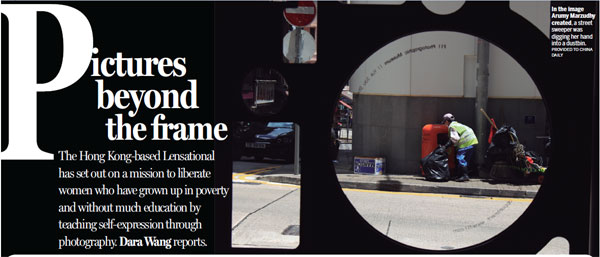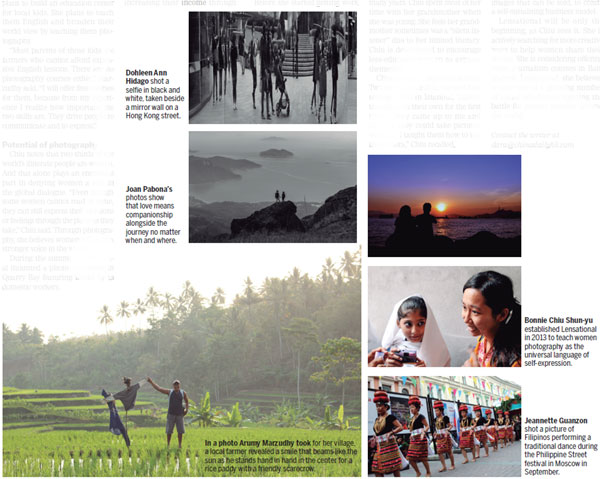Pictures beyond the frame
Updated: 2016-10-18 09:37
By Dara Wang(HK Edition)
|
|||||||||
The Hong Kong-based Lensational has set out on a mission to liberate women who have grown up in poverty and without much education by teaching self-expression through photography. Dara Wang reports.
On a weekend afternoon about a year ago, an Indonesian house maid Arumy Marzudhy saw something that changed her life while strolling on a Hong Kong street. Probably it didn't occur to her at the time that her life might be changed by seeing an old street sweeper bending to reach into a dustbin, nearly dwarfed by the pile of garbage bags that was already filled after one day toil.
Marzudhy recognized herself in that scene. At 28, she resigned herself to a lifetime scrubbing toilets in Hong Kong. The young woman took out her camera and snapped the picture through the "eye" of the concrete lattice work across the road - cold, dispassionate, offering no empathy - just as she felt others saw her.
"I felt I was just like her, working hard for money, even handling rubbish to earn it," said Marzudhy.
The young domestic helper's transformation started after she took up photography as a hobby at "Lensational", a social enterprise whose mission is to teach women the universal language of self-expression, especially for those who may be subjugated in male dominated, patriarchal societies.
Every weekend, Lensational gathers its pupils in parks or on the streets of Hong Kong. Sessions are supervised by a volunteer tutor, who guides them toward mastery of the DSLR (Digital Single Lens Reflex) cameras and teaches them photo editing.
Marzudhy is one of 400 women around the world, learning photography from Lensational. The organization's founder is Bonnie Chiu Shun-yu, 23, a Hong Kong native. She tells China Daily her organization has over 60 volunteers working in 18 countries and regions, including Pakistan, Bangladesh, Kenya and Cambodia.
Chiu has made it her mission to show women that they can overcome their challenges and achieve their goals, the same as men. Photography is a good start and a field that Chiu says is ready for change.
Marzudhy is able to apply critical appraisal to her work when she looks at that photograph she feels the clammy texture of the damp garbage and smells the sour odor from the viscous liquid dripping out from the garbage bags.
It was sunny that day when she took her photos. To capture the feeling, she opened the aperture of her camera and slowed the shutter speed so that the elements of her shot were shown in striking contrast, as the sunshine beat down on the road while the place behind the lattice remained cast in shadow.
Photography was more than taking pictures. For Marzudhy, it was a means of venturing forth toward self-initiation, discovering the magical power to express feelings long suppressed and nearly forgotten.
Her home was in Plumbangan, a village in Indonesia. Her life was here in Hong Kong, but her hometown was always in her thoughts. She always fancied finding the means to make life "better" back in her village.
"Many migrant workers from my hometown have returned home after getting old, without dreams and ambitions. They use their money to buy cars, beautiful houses and fields. That isn't the life I want," Marzudhy said.
Her "real dream" was to help her hometown to flourish by attracting more tourism. Her discovery of her talents in photography has become her vehicle for achieving that goal.
She began gathering welcoming images of her hometown, with an image of a local farmer wearing a smile almost as big as himself standing in a rice paddy where even the scarecrow is friendly.
The colors and the pristine purity of the place drew her Hong Kong employer and a reporter to visit her hometown.
"Villagers are so happy to see visitors. They volunteered to guide the tour around and even take them rafting on the river," she said.
Marzudhy's confidence grew along with her conviction that she could make life better for the people of her rural village. In June, she bought a piece of land in the village - 800 square meters - where she plans to build an education center for local kids. She plans to teach them English and broaden their world view by teaching them photography.
"Most parents of those kids are farmers who cannot afford expensive English lessons. There are no photography courses either," Marzudhy said. "I will offer free courses for them, because from my experience I realize how important the two skills are. They drive people to communicate and to express."
Potential of photography
Chiu notes that two thirds of the world's illiterate people are women. And that alone plays an enormous part in denying women a role in the global dialogue. "Even though some women cannot read or write, they can still express their opinions or feelings through the pictures they take," Chiu said. Through photography, she believes women will earn a stronger voice in the world.
During the summer, Lensational mounted a photo exhibition in Quarry Bay featuring works by 15 domestic workers.
Dohleen Ann Hidago shot a selfie in black and white beside a mirror-wall on a Hong Kong street. Though she shot herself with others in the same frame, the subtle distance forms an invisible wall that isolates her from others, bringing a feeling of loneliness.
Meanwhile, blending the selfie and the public environment communicates her eagerness to be integrated into the city. The caption reads "When I go out shooting, I usually go alone With this particular shot, I include myself among the people around me."
Joan Pabona set out to interpret love in photographs where men and women play equal roles in the romantic bonding. Pabona likes to take her photo walks in the mountains or beside the sea where she photographs couples. She tries to show that love means companionship along the journey, whenever and wherever.
The opportunity for more women to express themselves goes hand in hand with the need for the economic empowerment of women, who earn less income on a global scale than their male counterparts. This imbalance is another motivation for Lensational. Chiu believes that underprivileged women, by increasing their income through photography, will be able to claim more of their economic rights and achieve their goals and dreams.
"Women in Lensational will receive 50 percent of the revenue from their photographs and related products purchased through exhibitions or through the website. They can also pursue freelance photography opportunities locally," says Chiu.
Thirty-one year-old Jeannette Mora Guanzon, who joined Lensational in Hong Kong in 2013, exemplifies that aim. A year of photography training brought out Guanzon's courage to venture into unknown areas. She moved to Moscow two and a half years ago.
While working as a domestic helper in Moscow, Guanzon helped establish Lensational in her free time by conducting photography workshops in the hallway of the Philippine embassy. Soon after, the embassy began to employ her as a professional photographer and engaged her to photograph events.
Guanzon shot the Philippine Street festival in Moscow in September. In the photos, Filipinos perform a traditional dance. Her photos are now used for promotion on the embassy's official website. Guanzon is paid around 2,000 rubles ($31.7) for each event.
Before she started getting work through the embassy, Guanzon described professional photography as "an expensive dream." She did not own a DSLR camera until her ex-employer in Hong Kong bought a Canon 650D for her. To get it, she paid one-year installments from her slender wages.
"Though I do not earn too much through photography, I feel so overwhelmed when people recognized me as a photographer. I never dared to imagine that before as a house maid," said Guanzon.
With growing public recognition of her work, she plans to open her own photo shops in her hometown within three to five years. "I am getting older now and being a photographer is challenging. However, if I don't realize my dream, I will regret it forever," Guanzon said.
For the sake of ambition
Chiu expresses pride in the achievements of women like Marzudhy and Guanzon who have become "brave, confident and who aspire to climb the ladder". Chiu herself is among these dreamers and doers.
Chiu's grandmother fled from Indonesia to Hong Kong in her childhood and afterwards she worked at a government factory for many years. Chiu spent most of her time with her grandmother when she was young. She feels her grandmother sometimes was a "silent listener" due to her limited literacy. Chiu is determined to encourage less-educated women to express themselves.
Chiu started Lensational in 2013. Two years before that, she met four teenage girls in Istanbul, Turkey, travelling on their own for the first time. "They came up to me and asked if they could take pictures with me. I taught them how to use the camera," Chiu recalled.
To her surprise, despite speaking different languages, Chiu and the girls were able to communicate through their photos. The experience inspired her to teach women photography as a means of self-expression.
Starting from a Facebook page, Lensational has grown into a social enterprise with a global network.
"I try to do my best so volunteers won't be disappointed in me," says Chiu, who has a full-time job to support her social enterprise work. She often sacrifices sleep time to run Lensational at night.
Chiu never likes the easy way. While pursuing her master's degree in 2013, Chiu set up a new Lensational headquarter in London. When asked why, Chiu said she just wanted to challenge herself. "In Hong Kong, I have a lot of support from family and friends and it is quite comfortable for me, while in London, I really needed to build from scratch."
The enterprise has more projects in the pipeline. New photography groups will start in Ghana and Honduras. The non-profit may even employ a staff member to support its expanding global volunteer network. Part of the mission is to produce even higher-quality images that can be sold, to create a self-sustaining business model.
Lensational will be only the beginning, as Chiu sees it. She is actively searching for more creative ways to help women share their stories. She is considering offering video journalism courses in Bangladesh. Lensational, she believes, is only one of a growing number of social enterprises fighting the battle for gender equality around the world.
Contact the writer at
dara@chinadailyhk.com


(HK Edition 10/18/2016 page5)